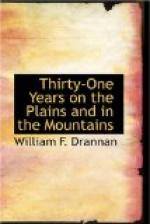We succeeded in killing four buffalo out of the band, the last one being within a hundred yards of camp. We dressed them and all hands volunteered to carry the meat to camp where it was turned over to the committee to be distributed among the people of the entire train.
This was a great treat to them, for they had been living on bacon for a long time, having no fresh meat whatever.
It was twenty-five miles from here to the next place where we could find water and a suitable camping place where we would also have a good chance to protect ourselves from Indians. So we pulled out early, I distributing my scouts as usual, only that I went alone and had a hard ride for nothing.
After I had gone quite a distance I saw what I supposed to be Indians; but they were a long way off. The thought struck me that it was the was the same band we had seen before and that they were sneaking around intending to steal a march on us and attack the train while traveling and stampede the stock, which was often done when no scouts were kept out for their protection. I started to follow them up and did not find out my mistake until I struck the trail of my supposed band of Indians which to my surprise proved to be a buffalo trail and instead of Indians I had been following a band of buffalo all day.
That night I laid out and the people in camp were very uneasy about me, thinking I never would return, as they thought I must have been killed by Indians. Jim told them not to be alarmed as I would turn up all right the next day.
On a trip of this kind I usually took a lunch along with me; but not expecting to be out long this time I did not take anything to eat, so I had to starve it out until I got back to the train, which was the next day at noon.
I did not see any fresh Indian sign on the entire trip; neither did the other scouts see any sign of them, and we concluded that if we did not have any trouble for three days, we would be out of danger of the Sioux, for by that time we would be out in the Bitter Creek country and there was no fear of Indians there.
All went along smoothly and we did not see or hear of any more Indians until we got to Fort Bridger. Here I met one of Gen. Connor’s men who told me that the Utes were very bad in the vicinity of Fort Douglas near Salt Lake, that being the place where Gen. Connor was stationed at that time. He said that they had not been able to get a fight out of the Indians yet, although they had followed them around a great deal.




